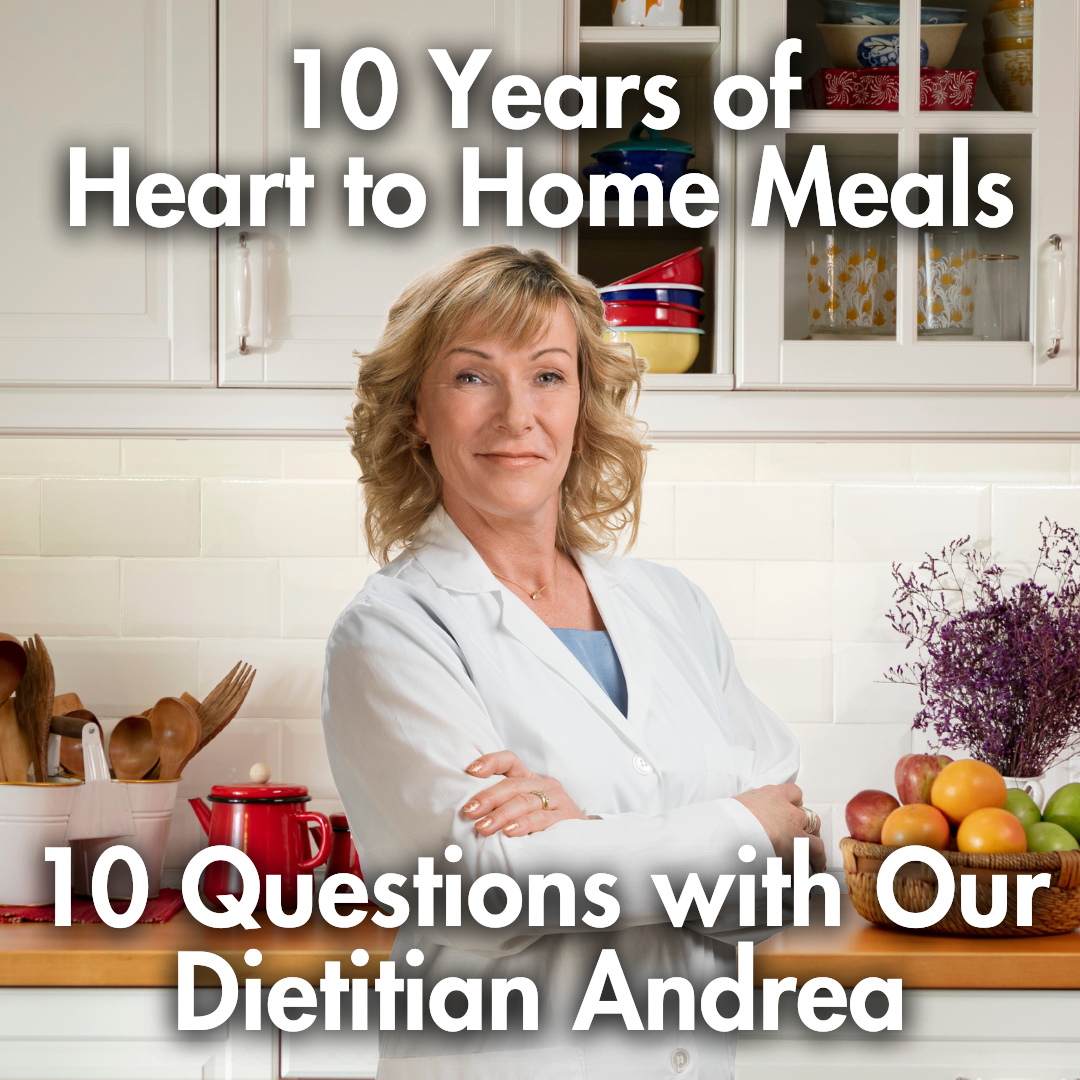.png?lang=en-CA)
This season marks a very special milestone for Heart to Home Meals: 10 years of cooking for you! Thank you for making the past 10 years so rewarding for us… we’re excited to keep cooking for you for many more years to come.
To celebrate our 10th anniversary, our dietitian Andrea Olynyk, R.D., has answered your top 10 senior nutrition questions. We hope you enjoy reading below as much as we have enjoyed reflecting on your thoughtful questions over the years.
Please note that we recommend consulting with your doctor or healthcare professional before making any modifications to your regular diet, and to ensure that your meal choices align with your personal nutritional needs.
.png?lang=en-CA)
1. How much salt can I have per day?
Health Canada generally recommends that Canadian adults consume between 1200-1500 mg of sodium per day, and not exceed 2300 mg per day – equivalent to about one teaspoon of salt. Reducing sodium intake below 2300 mg lowers the risk of cardiovascular and other chronic diseases, however it’s equally important to consume enough sodium to avoid muscle weakness, cognitive impairment, and nausea. It’s important to speak with a healthcare professional to find your personal sweet spot in getting the right amount of sodium for you.
2. Do I need to be avoiding fats in my meals?
“Fats” often get a bad rep for being unhealthy, but not all fats are bad! Monounsaturated fats, such as those found in olive oil, boost heart health to reduce the risk of stroke. Omega-3 fats, found in eggs and fatty fish like salmon, are essential for proper brain function and anti-inflammation. Saturated and trans fats on the other hand are best avoided. Often used in processed foods, these fats can lower good cholesterol and raise bad cholesterol, increasing the risk for disease.
3. Should I be “counting carbs”? And how many do I need?
Carbohydrates are the primary energy source for the brain and the fuel that keeps our bodies active. When it comes to “counting carbs”, the general recommendation is to aim for about 130-180g daily, although those with dietary restrictions as directed by their doctor may have a different number. It’s best to spread carb intake out through the day to maintain blood sugar stability.
4. How much protein do I need per day?
Seniors need adequate protein to help repair and maintain muscle tissue and to aid in skin wound healing. Protein also helps to keep us fuller longer. The math usually equals out to 1 to 1.2g of protein for each kilogram of bodyweight, or a general guideline of at least 50-60g of protein per day.
5. I always hear I should be increasing my fibre intake. How do I do this?
Fibre helps promote healthy gut bacteria and offers support for heart health, blood sugar levels, bowel regularity and more, making it a game changer for senior health. Generally, women 50+ need 21g of fibre per day while men 50+ need 30g per day. While this may seem like a lot, including a variety of fibre-rich foods in your diet – such as whole grains, legumes, fruits, and vegetables – can make it easier to meet these recommendations.
6. Do I get enough vitamin D from being outdoors alone?
Vitamin D, known as the "sunshine vitamin," is critical for seniors. It aids in calcium absorption and promotes bone mineralization. Exposure to sunlight helps with vitamin D, as do fortified dairy products, eggs, and fatty fish. But the body’s ability to produce vitamin D from sun exposure declines with age. While there are foods containing some vitamin D, Canada’s dietary guidelines recommend that people over the age of 50 take a daily supplement to ensure they’re not deficient.
7. How important is vitamin C for a senior?
Vitamin C plays a vital role in supporting our immune systems and protecting us against illnesses, with some studies suggesting that it helps shorten the duration and severity of the dreaded common cold (yes please)! Our bodies need it to maintain healthy blood vessels, gums, cartilage, and more, especially as we age. Found in citrus fruits, berries, cruciferous and root vegetables, you can help boost immune resilience by incorporating these colourful and nutrient-packed foods into your meals. Heart to Home Meals includes these vitamin C rich veggies in almost every single dish, ensuring each meal is a nutritional superstar.
8. Is Heart to Home Meals suitable for my specific diet type or individual diet restrictions?
Although Heart to Home Meals’ diet codes provide a quick and easy way to understand what nutritional benefits a meal offers, it’s important that recommendations be customized to specific individual dietary requirements. I recommend consulting with your doctor or dietician for personalized advice tailored to your unique dietary needs, and to review which meals may be suitable for your specific diet. Empowering you to make informed decisions, your My Menu features comprehensive nutritional information, and detailed ingredient lists are available on the website.
9. Do I have to be a senior to enjoy meals from Heart to Home Meals?
Absolutely not! Heart to Home Meals are designed to meet the nutritional needs of seniors, however they create delicious products that everyone of all ages can enjoy.
10. Where can I learn more about senior nutrition?
You can learn more about senior nutrition with our quick-guide videos at the link here on HeartToHomeMeals.ca. You can also browse our other Heart to Home Meals blog articles for more topics on senior wellness, nutrition, and aging in place.


